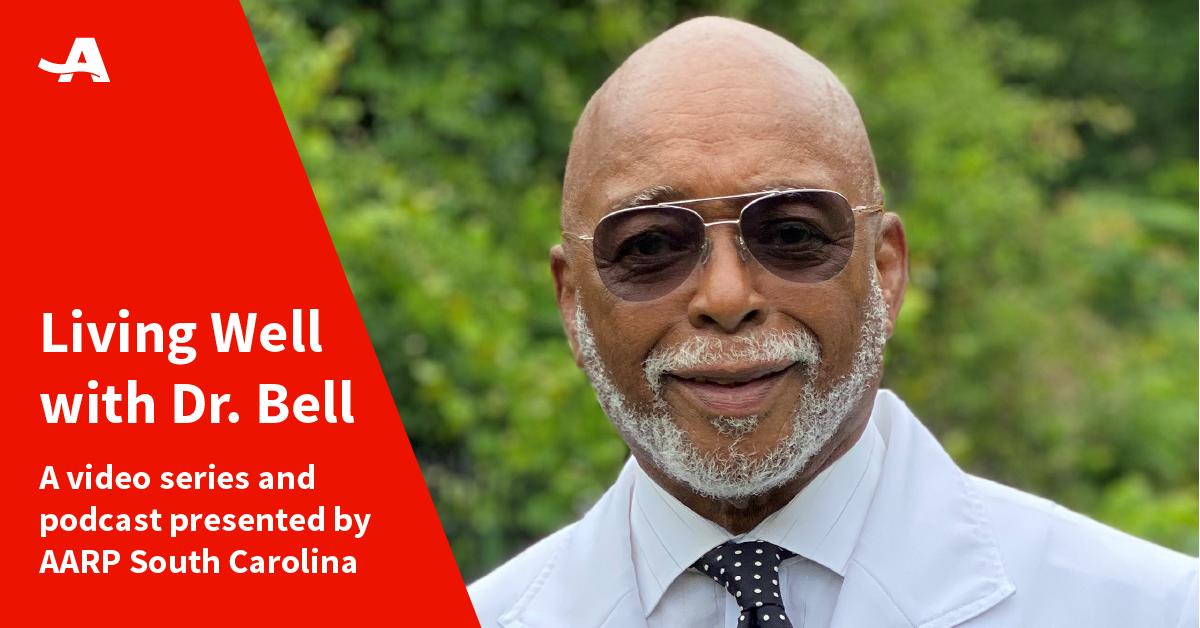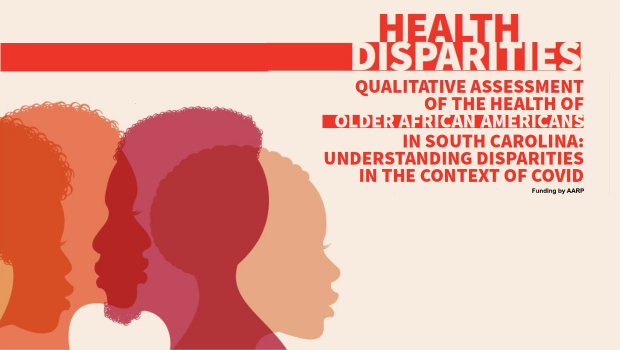AARP Hearing Center
AARP SC Health Disparities Report finds disparities among Blacks 50+ in South Carolina in 12 of the 14 leading causes of morbidity and mortality
AARP South Carolina released the full Health Disparities: South Carolina Non-Hispanic Black People Aged 50+. Nowhere are these disparities clearer than the COVID-19 pandemic where Black people have suffered much higher case rates and nearly two and half times the mortality rate compared to White people.
AARP SC commissioned the report in collaboration with the South Carolina Aging Research Network, Clemson University Institute for Engaged Aging, University of South Carolina Arnold School of Public Health and the Medical University of South Carolina Center on Aging.
Health Disparities: South Carolina Non-Hispanic Blacks Aged 50+

“We wanted to better understand the impact of health disparities on SC’s 50+ African American population and the high number of African Americans contracting and dying from COVID-19,” stated Jo Pauling-Jones, AARP SC associate state director for advocacy and outreach.
Cheryl Dye, Ph.D., founding director of the Clemson University Institute for Engaged Aging and professor emeritus in Clemson’s Department of Public Health Sciences stated, “We examined 14 leading causes of morbidity and mortality and eight social determinants of health,” reported Dr. Dye. “Of those 14 causes of morbidity and mortality, African Americans aged 50 and older in South Carolina suffered disparities in 12. And then as we examined the social determinants of health—the eight we looked at—older South Carolinian African Americans suffered disparities in seven.”
Findings include:
- South Carolina ranks in the top 10 of states of those ages 50 to 60 at risk for hunger, third in the nation for food insecurity for seniors age 60 and older, and second for the number of people 50-59 with hunger.
- The risk for hunger for African Americans and Hispanics is twice that of White people.
- Heart disease death rate for Black people was 27% higher than for non-Hispanic White people.
- African Americans have higher rates of hypertension (70.7% vs 54.6%) compared to White people.
- Black people also have higher rates of diabetes (29.2% vs 20.1%) and are twice as likely to die from diabetes compared to White people.
- Black people are also 61% more likely to die from stroke than White people.
- Black people have a 21% higher chance of getting colorectal cancer and a 50% higher chance of dying from it compared to non-Hispanic White people.
- Black men are 1.9 times more likely to get prostate cancer and 2.7 times more likely to die from it compared to non-Hispanic White men.
- Black people are 64% more likely to have Alzheimer’s disease and related dementias (ADRD) compared to White people.
- 8.8% of White people and 14% of Black people responded there was a time in the past 12 months they needed to see a doctor but could not because of cost.
- More than 17% fewer Black people reported visiting a dentist in the past 12 months compared to White people and 5% more African Americans report have lost all of their teeth.
“The findings in this report are tragic and alarming. We want to find out how we can develop policies to eliminate health disparities in SC,” said Teresa Arnold, AARP SC state director.
Lucy Ingram, Ph.D., associate professor at the University of South Carolina Arnold School of Public Health stressed, “Coordinated public health and healthcare efforts on assuring [Black people] receive vaccinations as soon as possible.”
Other major recommendations included:
- Greater public health efforts are needed to reduce the high rates of hypertension among African Americans.
- Hypertension plays a large role in heart disease and stroke as well as ADRD.
- Black people suffering from a combination of diabetes, obesity and hypertension should be prioritized to receive targeted, coordinated and culturally appropriate healthcare and education.
- There is a need for efforts to expand dental care to Black people, as tooth decay and loss are risk factors for various chronic diseases such as heart disease and ADRD.
- Black communities need concentrated outreach and education to increase colorectal screenings and prostate specific antigen or PSAs.
- Social determinants of health such as poor housing, homelessness, unsafe neighborhoods and lack of transportation significantly contribute to health disparities in older African Americans and require creative coordinated solutions through multi-agency collaboration.
AARP is grateful for the work of Cheryl Dye, Ph.D., Lucy Ingram, Ph.D., Heather Boger, Ph.D. as well as Kelsey Vinson, MS on this important project.
AARP SC’s Health Disparities Project will continue with Phase Two: Qualitative Assessment of Health of Older African Americans in South Carolina: Understanding Disparities in the Context of COVID.
AARP SC is also taking steps to address these health disparities by producing Living Well with Dr. Bell starring Jo Pauling-Jones and Thaddeus John Bell, M.D. of Closing the Gap in Healthcare in Charleston, S.C. The live show airs on the first Friday of each month at noon on AARP SC’s Facebook page and addresses issues related to health and health disparities as well as answering health-related questions live.
You can view the entire series of Living Well with Dr. Bell on our Facebook page.

On March 30, 2021 AARP South Carolina staff and university researchers presented a "deep dive" into health disparities research for an online audience.
Health Disparities Report: Phase Two Qualitative Assessment

AARP South Carolina Health Disparities: Phase Two Qualitative Assessment































































